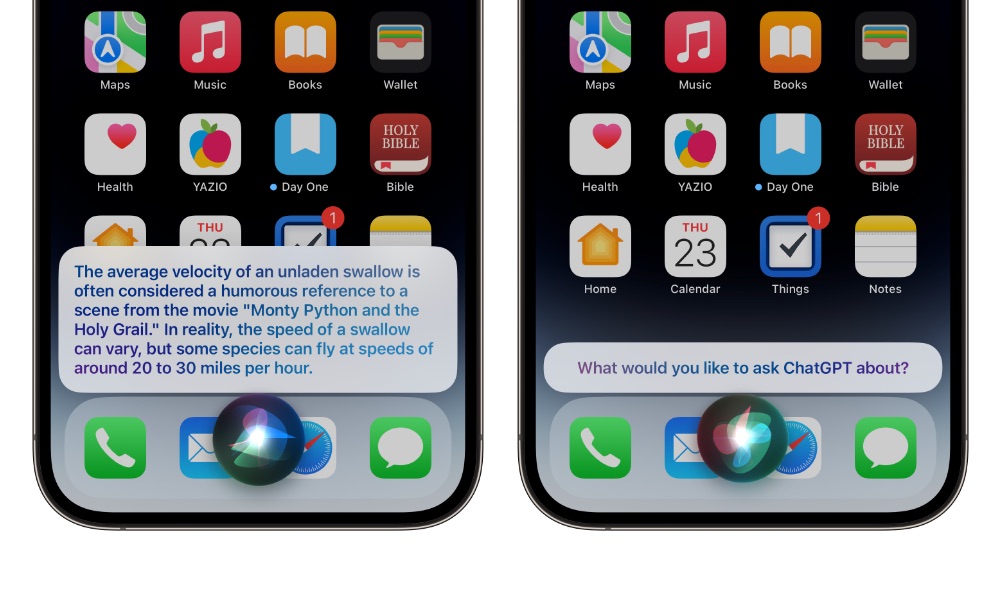Siri and ChatGPT May Join Forces in iOS 18

Toggle Dark Mode
There’s a good chance that OpenAI’s ChatGPT technology may soon be built into your iPhone, at least behind the scenes.
Although it remains to be seen what form it will take, a recent report from Bloomberg indicates that Apple and OpenAI are close to an agreement to “use ChatGPT features in Apple’s iOS 18.” This follows an earlier report that Apple was in talks with Google about using its Gemini technology; it’s unclear what stage talks are at, but it sounds like ChatGPT could be getting the nod.
The most likely role of a conversational generative AI chatbot like ChatGPT would be to offer improvements to Siri. On Friday, The New York Times added its voice to the chorus of reports that Siri will be getting generative AI features this year. While there’s little new information in the report by the Times, the timing of it with Bloomberg’s news of an impending OpenAI is interesting.
After all, most people agree that Siri could use some serious improvements, and, even though the Times said that the decision to give Siri a “brain transplant” only came early last year, by all reports Apple has been hard at work on improving Siri since 2019, shortly after it hired John Giannandrea away from his spot as AI chief at Google to head up its own AI efforts. So, it’s not particularly surprising that Siri will be at the center of Apple’s AI strategy this year.
Still, there could be more to OpenAI’s technology than just ChatGPT-style improvements to Siri. Bloomberg says that ChatGPT would be part of “a flurry of new AI features.” While Apple’s CEO, Tim Cook, has said that he personally uses ChatGPT, he’s also concerned about “a number of issues that need to be sorted,” promising that Apple plans to take a “very thoughtful” approach to how it delivers AI features in its products.
During Apple’s Q2 2024 earnings call at the beginning of May, Cook said that some “very exciting things” were coming soon, but that Apple’s take on AI would be different from what others are doing as he believes Apple has unique advantages in that area.
We believe in the transformative power and promise of AI, and we believe we have advantages that will differentiate us in this new era, including Apple’s unique combination of seamless hardware, software and services integration.Tim Cook
As Cook has pointed out several times over the past year, Apple has been incorporating machine learning and AI into its software and hardware for years, however they’ve generally been used to power more subtle, behind-the-scenes features like Fall Detection and Crash Detection or more focused tools like Live Voicemail, Personal Voice, and the Journal Suggestions that arrived in iOS 17.2.
When we shipped iOS 17, it had features like Personal Voice and Live Voicemail. AI is at the heart of these features, and then you can go all the way to the life-saving features on the watch and the phone, like Fall Detection, Crash Detection. ECG on the watch. These would not be possible without AI.Tim Cook
Further, while most people associate “Siri” with the voice assistant, Apple also uses it to refer to AI features on the iPhone that offer Siri Suggestions to provide contextual notifications on your Lock Screen, look up names for unknown callers using information in apps like Mail, and automatically fill in information in searches and messages based on context.
However, what Siri has been missing all this time — and the thing that frustrates most people with it — is the conversational capabilities powered by generative AI. Siri works reasonably well if you know how to talk to it, but you shouldn’t need to learn special ways of interacting with Siri. While Siri obviously can’t read your mind (yet), it should be capable of understanding any request that would be decipherable by an average human.
That’s where OpenAI’s ChatGPT could be a big help. It’s already possible to talk to ChatGPT on your iPhone, and you can even set it up to be triggered by a Siri shortcut. However, at the end of the day, it’s still a separate app, which limits its usefulness for doing anything more than answering questions and generating text. Incorporating ChatGPT technology into the engine that powers Siri would let you integrate with other apps on your iPhone for sending messages, creating calendar appointments, controlling home devices, and calling up your favorite tunes in a much more natural and conversational way.
However, while Apple and OpenAI are said to be close to working something out, it’s not a done deal yet, and Bloomberg notes that even if the two companies come to terms, “there’s no guarantee that an agreement will be announced imminently.” Apple is also reportedly still having discussions with Google, so it seems the possibility of using Gemini for at least some of its AI features hasn’t been ruled out.
While Apple is working to use on-device processing for as many of its AI features as possible, it’s also building AI servers to handle more demanding tasks. However, there’s no word yet on where the split will be between these features.
[The information provided in this article has NOT been confirmed by Apple and may be speculation. Provided details may not be factual. Take all rumors, tech or otherwise, with a grain of salt.]









